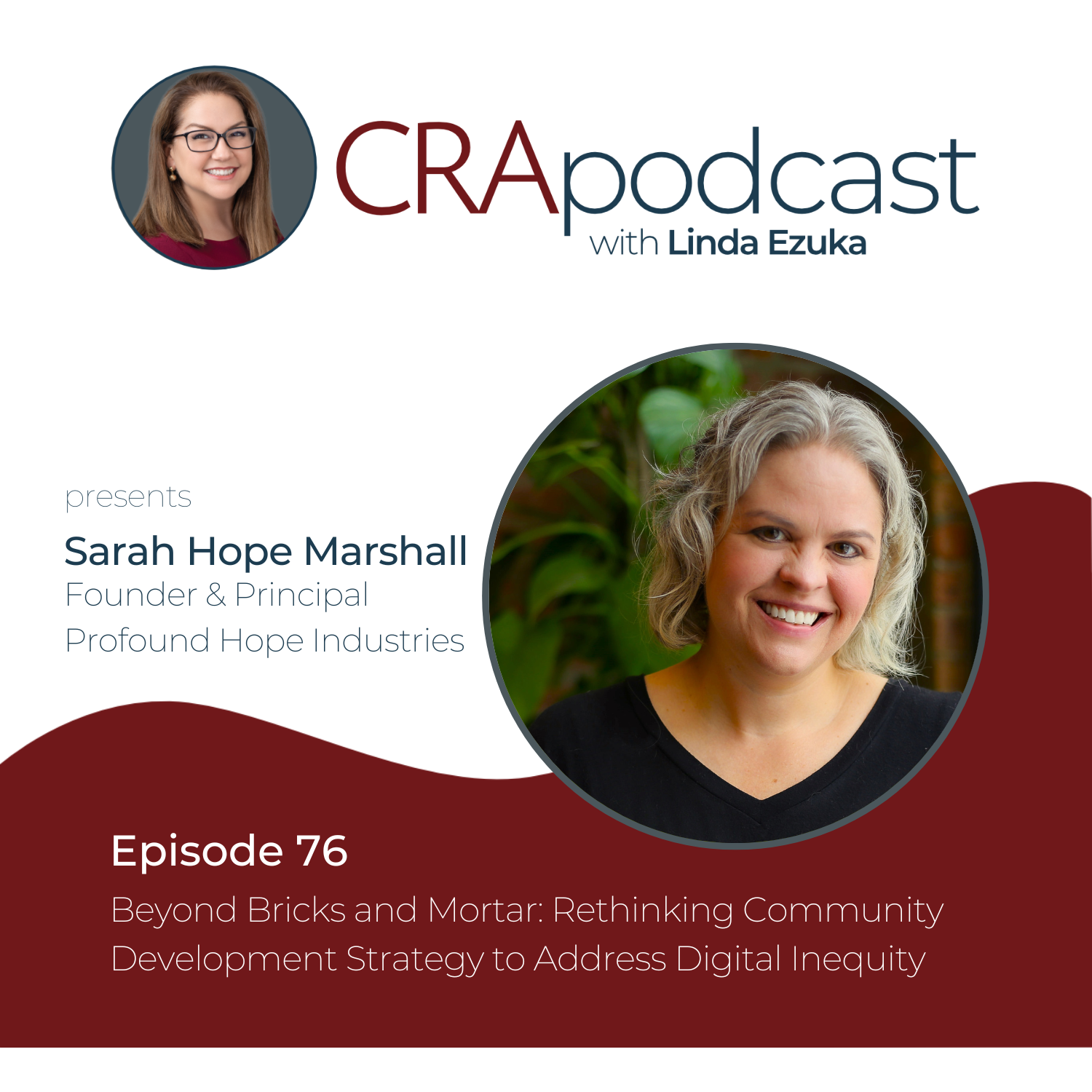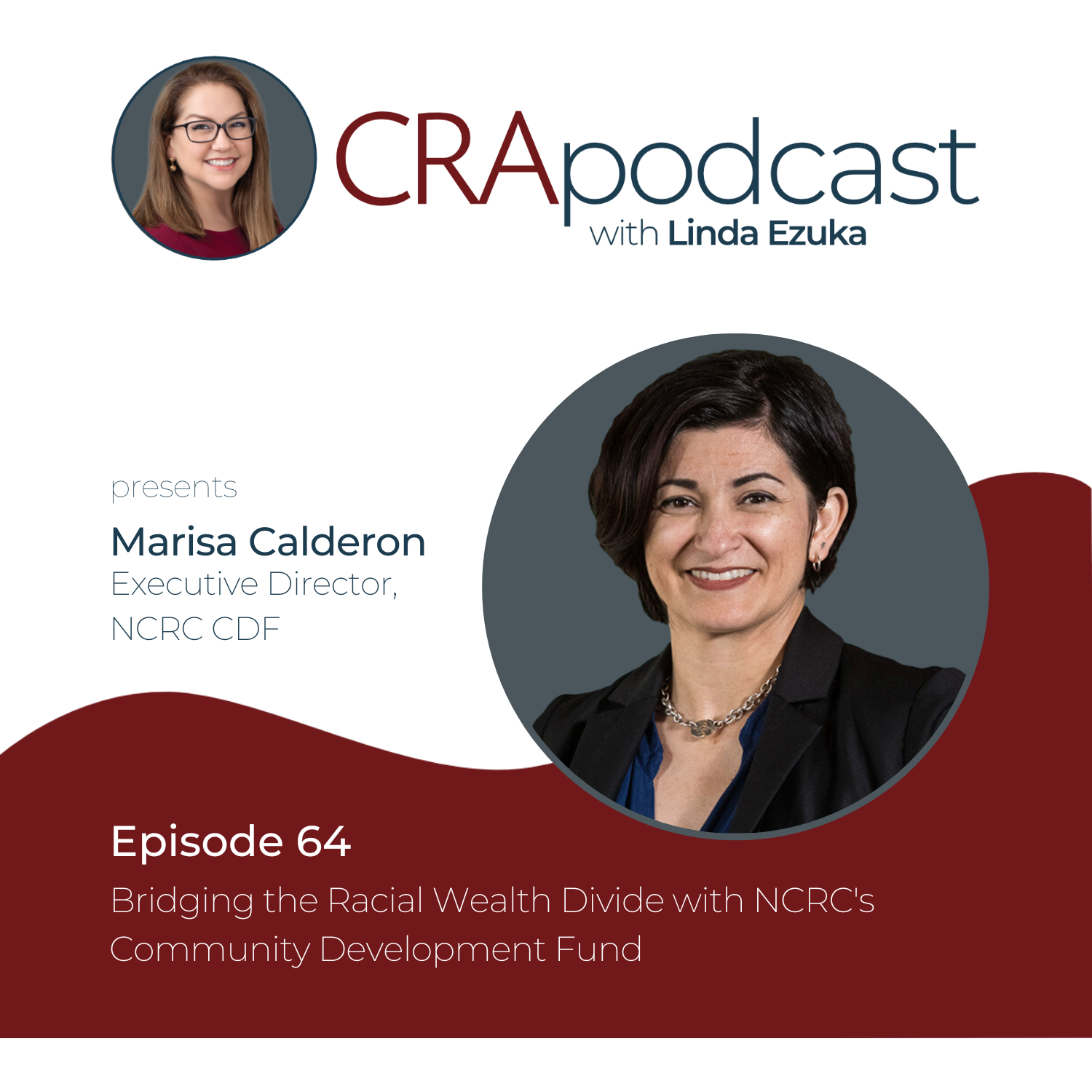Episode 76: Beyond Bricks and Mortar: Rethinking Community Development Strategy to Address Digital Inequity with Sarah Hope Marshall
Sarah Hope Marshall joins me here to reflect upon digital inequity in place-based community revitalization. Our discussion focuses on digital inequity and how community development professionals can revisit this as they revisit their community development programs. Here are some key quotes from our conversation:
“It made me pause and ask, wait a minute. This neighborhood that we’re in has a really rich history of community organizing and groups working together. There’s been books written about it. In my research, I’d done work studying the first-ever tenant buyout of a HUD affordable building that was turned into co-ops in this neighborhood I was working in. And so, I started asking the question, What happens when technology allows people to be more mobile, to be less attached to the community in the place they’re in?”
“If you think about the trajectory of where we are, CRA and the CDFI fund and the way that was initiated really came about because of place-based community organizing. And now, we’ve come to a place where technology has really expanded our social networks so that we’re constantly communicating with people all over the country.”
“It’s a different dynamic, and we adopt things slowly, so we don’t always pause to say, wait. How has my world changed because of technology?”
“I’ve been excited to see things that have developed and researchers who are working on things like tech ethics, digital equity, and the digital divide, but there’s still just a lot that’s unknown in terms of how technology’s really impacting our socioeconomic mobility and the choices that we have.”
“There’s an initiative called the National Collaborative for Digital Equity that has started a campaign called One Percent for Digital Equity, and the call is to ask CRA officers to commit one percent of their CRA budget to digital equity. It’s opened up a really powerful funding stream for organizations who are trying to do this work.”
“Digital equity really doesn’t have to be a new project, program, or strategic plan, but an overlay. Because if we think about the way technology really overlays everything we do and how we function as a society and our roles, it’s just a matter of pausing to ask those questions and encouraging the people that we interact and work with to ask those hard questions so that we’re achieving the goals that we set out to achieve.”
Contact Info for Sarah:
Sarah Hope Marshall
1-773-595-0974
sarahhope@profoundhopeindustries.com
subdomain.profoundhopeindustries.com/digital-equity
Article: Reckoning with Digital Inequity in Place-Based Community Revitalization:
https://www.jpna.org/index.php/jpna/article/view/873
1% for Digital Equity Campaign: https://www.digitalequity.us/1-for-digital-equity/
Article Abstract:
Place-based community development in America has a rich history. Practices and procedures for successful redevelopment are supported by lobbying efforts, public administration, policy, federal funding, and the efforts of non-profits dedicated to neighborhood revitalization. Community revitalization work is often centered around specific geographic locations, while in recent decades modern technology has caused social networks to become increasingly geographically disparate. Social networks have been demonstrated to support the economic mobility that community development strives to create. However, the impact of modern technology on place-based community development has not been clearly understood. Increasing digitalization has impacted the effectiveness of place-based social equity efforts such as community organizing, affordable housing and economic development, and financial capability interventions. This essay explores how place-based community organizing led to the creation of current policies that govern community development, how technology has impacted urban communities and how these changes may subsequently affect social equity objectives in public administration.
CRA Today Website: https://cratoday.com/
CRA Hub: https://cratoday.com/hub
Linda Ezuka, LinkedIn https://www.linkedin.com/in/linda-ezuka-cra-today/
Copyright © 2023 by CRA Today LLC
(No claim to original U.S. government material)
All rights reserved. No part of this podcast may be reproduced, stored in a retrieval system, or transmitted in any form or by any means, including electronic, mechanical, photocopying, recording, or otherwise, without prior written permission of the author and publisher.
This podcast is a periodic publication of CRA Today LLC and is intended to notify and inspire recipients of new developments in the Community Reinvestment Act. It should not be construed as legal advice or legal opinion on any specific facts or circumstances. The contents are intended for general informational purposes only, and you are urged to consult your own attorney concerning your situation and specific legal questions you have.
- Episode 82: CRA Tips: Less is More – Perfecting Your CRA File by Cutting the Clutter - November 7, 2023
- Episode 81: CRA Tips: 46th Anniversary of the CRA – How will you serve? - October 31, 2023
- Episode 80: CRA Tips: CRA Services Hours, Events, or Instances? What the What?!? - October 17, 2023



